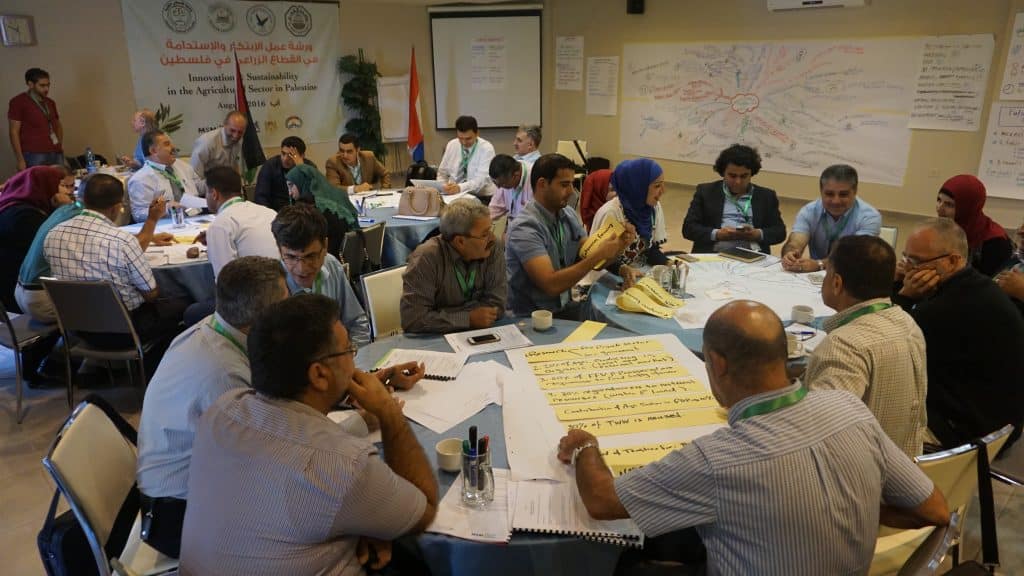TOOLS
FUTURE SEARCHDynamic 2.5-day co-creative process in which different stakeholders work together on shared ambitions and action plans.

WHAT?
Co-creative process in which different stakeholders work towards common action.
WHY?
To formulate ambitions and plans that all parties feel ownership of.
HOW?
2.5-day working conference with a reflection of the stakeholder field.
RESULTS
Shared vision of the future and widely supported action plans.
PROJECTS
- Co-creation Buurtteams Amsterdam
- Future of nature-inclusive Netherlands
- Women’s economic empowerment in Kenya
- Digital energy market
Future Search is a philosophy and methodology in the form of a dynamic working conference. A Future Search conference brings together different stakeholders around a complex issue. An issue that is urgent, in which each party has a stake and where people need each other to address it. In a carefully facilitated inquisitive process lasting 2.5 days, around 60 participants work on common objectives and action plans.
Purposes
Future Search is a co-creative process that results in shared ambitions and plans, that all stakeholders feel ownership of. It is used to jointly realise breakthroughs and initiate transformations. Future Search is used worldwide in a variety of sectors.
Future Search is based on four principles:
- the whole system in the room
- think global, act local
- focus on the future and common ground
- self-management and responsibility for action
Process
A Future Search brings the whole ‘system’ together in one room: a reflection of the broad stakeholder field around the issue at hand. Ideally, this should be 64 people: eight different stakeholder groups, eight people per group. The participant group is composed based on the ARE IN principle: people with Authority (decision-making power), Resources, Expertise, Information and Needs. In this way, the group consists not only of subject-matter experts or decisions-makers, but also, for example, professionals in the field, citizens or clients, and experts by experience.
A Future Search conference has a fixed agenda:
- focus on the past
- focus on the present
- focus on the future
- common ground and shared ambitions
- action plans
The conference is prepared by a planning team consisting of participants from each stakeholder group.
Results
Typical results of a Future Search are a shared vision, multi-year strategy, process design, strategic framework, implementation plan or action plan.
Added value
What is unique about a Future Search is that at an early stage all stakeholders work together in one room on a common issue. In dialogue and co-creation, participants learn to better understand each other and each other’s points of view. In this process, new insights and approaches emerge that no single party could have come up with alone, let alone implement. This provides a strong foundation for the implementation of plans and activities. And it contributes to a learning system, in which all stakeholders contribute to achieving the shared ambitions for the future.
Attributions
Future Search was developed in the 1990s by American facilitators Marvin Weisbord and Sandra Janoff. The methodology is described in detail in their book Future Search: Getting the Whole System in the Room for Vision, Commitment and Action. They are also founders of the Future Search Network. Perspectivity is one of the few Dutch members of this international network.
More information?
- Over the past 20 years, we have facilitated more than 50 Future Search projects. To know more, browse through our track record.
- Watch videos on the Future Search philosophy and on Future Search in practice.
- Visit the website of the international Future Search Network.
- Contact us to discuss how to use Future Search for your specific issue.
Change Agenda for the Agricultural Sector in Palestine
On 1 September, around 80 key stakeholders of the Palestinian agricultural sector agreed on a common ground for change towards a more innovative and sustained agricultural sector in Palestine. They had been working together during a three days interactive Future...
Revitalising Future Search at Tanzanian Telecommunications Company
Government officials, ICT partners, trade unions representatives, senior and middle management as well as technical, commercial and support staff come together in Dar es Salaam in May 2016 to discuss the future of the Tanzanian Telecommunications Company (TTCL). ...
Teletijdscafé: Ghent University Explores the Future
On the 6th of March, the Department of Engineering and Architecture of Ghent University gathered to explore their future. In a ‘Teletijdscafé’ orchestrated by Han Rakels, faculty, staff and students brainstormed about engineering challenges and how indies, archies and...
Future Search Training in Yemen
Future Search training for participatory policy development to increase participation of women in the higher education sector in Yemen. A group of 30 stakeholders participated in a Future Search in Addis Ababa to lay a foundation for a policy to improve participation...
Participatory policy making instruments for the Higher Education sector, Yemen
Ministry of Higher Education and Scientific Research (MoHESR) will have the capacity to plan, facilitate and follow-up “participatory policy development” using Future Search as an instrument, and will have initiated the development of policies for the higher education...
Future orientation of effective partnership amongst Burundian civil society organisations
CARE Burundi is reconsidering its role and is moving from the implementation of projects -together with its partners- towards the role of catalyst and facilitator for the partner organisations. This change foresees more independent and sustainable partner...
Our toolbox
In our work, we use a broad range of methodologies and approaches that lean on decades of experimental research. We gratefully build on the theories and concepts developed by our teachers and colleagues. To achieve sustainable results, we determine which method fits every project best.
Methods we frequently use:







